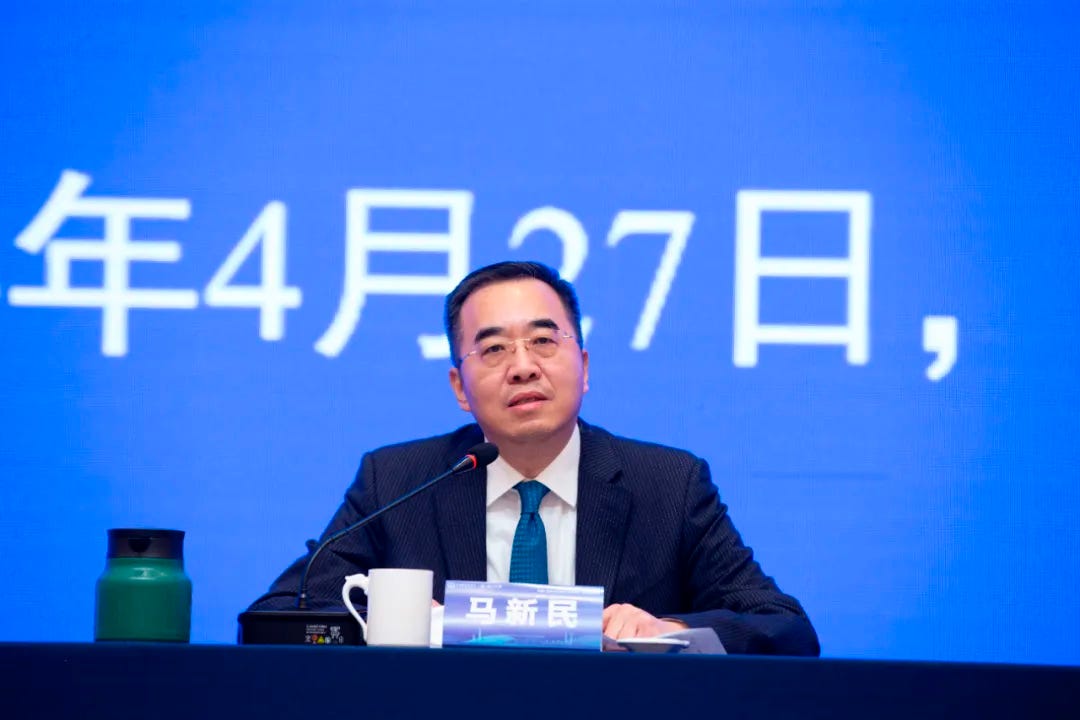Legal adviser of China's foreign ministry: "four battles" between the West and the East on global AI governance
I'm sharing a keynote speech delivered by Ambassador Ma Xinmin, the Legal Adviser to China's Ministry of Foreign Affairs and Director General of the Treaty and Law Department, at the annual conference of the Chinese Society of International Law(中国国际法学会). This speech is a significant summary of China's stance on international law, including aspects of cyberspace governance. This year's keynote notably addressed "global rules on AI governance" in detail, marking a significant focus beyond the traditional "cyber international law" topics typically covered by the Treaty and Law Department.
The first part highlights the important role of general international law and specialized international law in global AI governance. The draft convention on AI initiated by the Council of Europe was mentioned and argued as the potential first international convention on AI. The UN resolution led by the U.S. but also participated by China was not mentioned clearly, and intentional blurring was applied.
Artificial intelligence is an important tool that comprehensively empowers human society in both production and daily life, but it also brings unpredictable global risks and complex challenges. International law provides a regulatory framework for the development, security, and governance of artificial intelligence: In terms of general international law, the principles of the United Nations Charter are the foundational norms for governance; in the area of specialized international law, international humanitarian law and international human rights law play significant normative guiding roles; in terms of regional legislation and soft law processes, this March, the Council of Europe released a draft of the "Convention on Artificial Intelligence, Human Rights, Democracy and the Rule of Law," which may become the first international convention on artificial intelligence. The number of soft law documents from UN resolutions, specialized UN agencies, and other intergovernmental international organizations continues to increase.
人工智能是全面赋能人类社会生产生活的重要工具,也带来难以预知的全球风险和复杂挑战。国际法为人工智能发展、安全和治理提供规则框架:一般国际法方面,《联合国宪章》原则是治理的基础性规范;专门领域国际法方面,国际人道法、国际人权法具有重要规范指引作用;区域立法和软法进程方面,今年3月欧洲委员会发布《人工智能、人权、民主和法治框架公约》草案,或将成为第一个人工智能国际公约,联大决议、联合国专门机构和其他政府间国际组织的软法文件不断增多。
Then, the keynote praised the EU for having played a leading role in regulating AI, and acknowledged that the U.S. has taken promoting innovation and value-oriented approaches. It described China’s approach to governing AI as multi-dimensional, prioritizing legislation with urgent needs, and focusing on key areas.
Domestically, the European Union has always been at the forefront of legislating artificial intelligence, while the United States has issued a series of policy documents on artificial intelligence, focusing on promoting innovation and value-oriented approaches. In China, artificial intelligence governance balances risk prevention and innovation promotion, establishing a multi-dimensional governance system of law, ethics, and policy, focusing on prioritizing legislation with urgent needs, and strengthening management and standardization in key areas.
国内法方面,欧盟一直走在人工智能立法的前列,美国就人工智能发布系列政策文件,侧重促进创新和价值观导向。我国人工智能治理上兼顾防范风险和促进创新,建立法律、伦理、政策多维治理体系,并注重在立法方面急用先行,加强重点领域管理与规范。
The last and most noteworthy part is that the keynote discussed “the four battles” regarding global AI governance.
Overall, the global governance of artificial intelligence requires a balanced approach to the battle for "governance dominance," "different regulatory concepts," "between data sovereignty and data sharing," and "between AI development, national security, and human rights protection."
整体而言,人工智能全球治理需要平衡处理好“治理主导权之争”“监管理念之争”“数据主权与数据分享之争”“人工智能发展、国家安全与人权保护之争”。
This seems to reflect China's traditional "battle mindset" in global AI governance. The battle for "governance dominance" may concern whether it’s the U.S. or China, the West or the East, that will lead the formulation of an international AI regulatory regime.
The "battle of regulatory concepts" appears to transfer the divergence between China and Western countries in global cyber governance to the AI field, highlighting the potential conflicts between AI governance concepts based on Western values and China's sovereign right to regulate AI domestically under its laws.
The battle between "data sovereignty versus data sharing" emphasizes data issues in AI governance, seemingly referring to the clash between China's advocated data sovereignty and the cross-border data retrieval models adopted by the US and its Western allies.
The "battle between AI development, national security, and human rights protection" stresses the interplay among these three sets of values, involving China's emphasis on the "right to development" and the West's focus on "human rights." Specifically, in the context of US-China relations, this is manifested in the negative impacts on China's legitimate development rights caused by the US's export controls on critical and emerging technologies based on national security reasons.
As a former international law practitioner, I’ve been frustrated by the fact that international society simply hasn't negotiated any international law on cyberspace governance since the Internet was created several decades ago. To me, geopolitical considerations and excessive politicization are the main culprits that lead sovereign nations into a vicious circle of mutual suspicion. They either suspect that any international assertion by the other party conceals some unspeakable strategic intent aimed at harming their interests, or they suspect that the other party aims to demean and isolate them by promoting certain values. Alternatively, they might label each other as authoritarian or hegemonic and nitpick the other party's reasonable domestic regulatory measures. This prevents countries from focusing on the real issues of global governance and the urgent threats facing human society.
Tomorrow, China and the U.S. will kick off their first intergovernmental dialogue on AI in Geneva. The global governance of AI largely depends on these two AI superpowers reaching some basic consensus. Only by stepping out of any "battle mindset" and biases based on values and social governance models can the two countries hope to collaboratively address the risks posed by AI, whether they are "existential risks" or ordinary risks.


